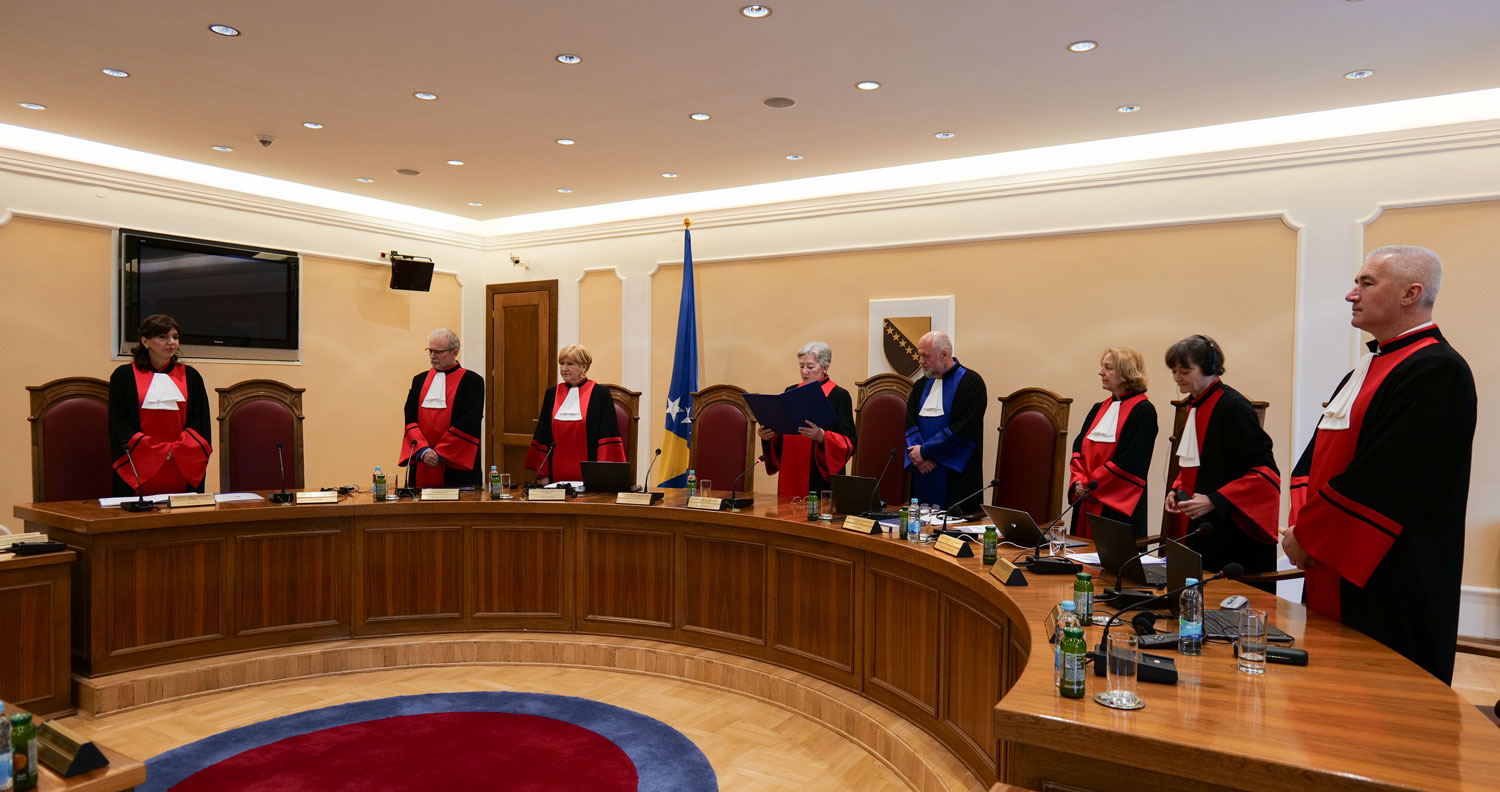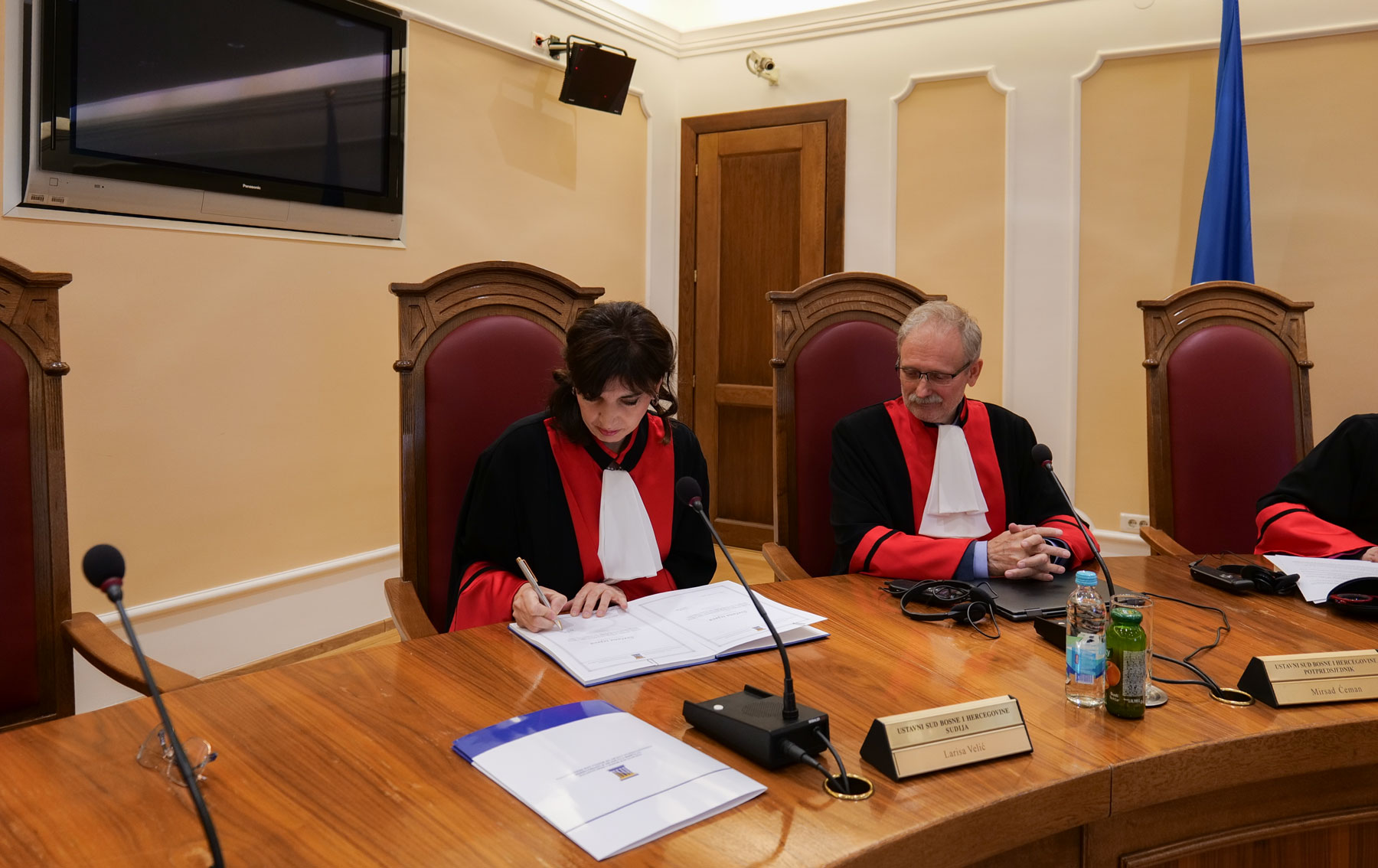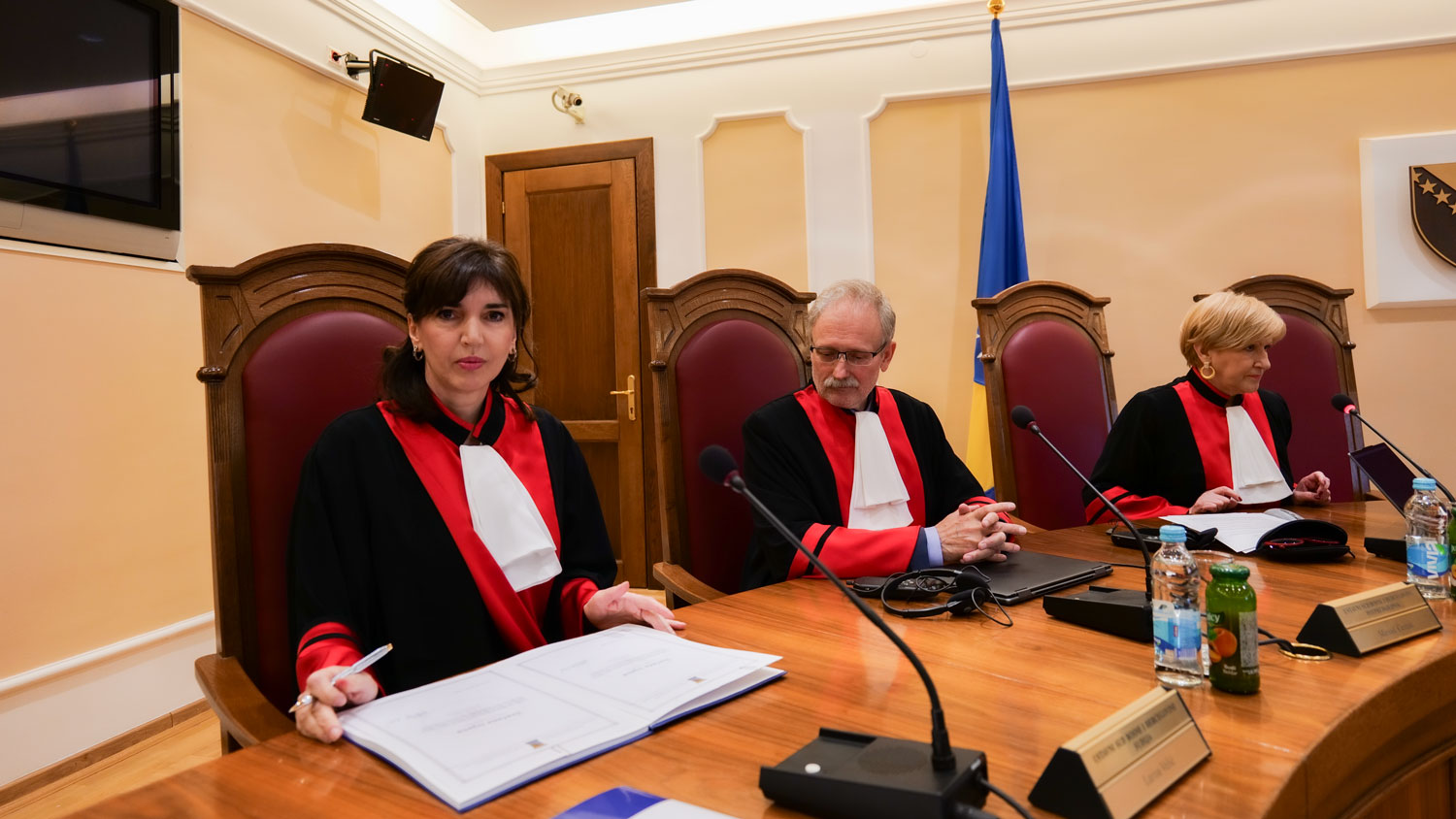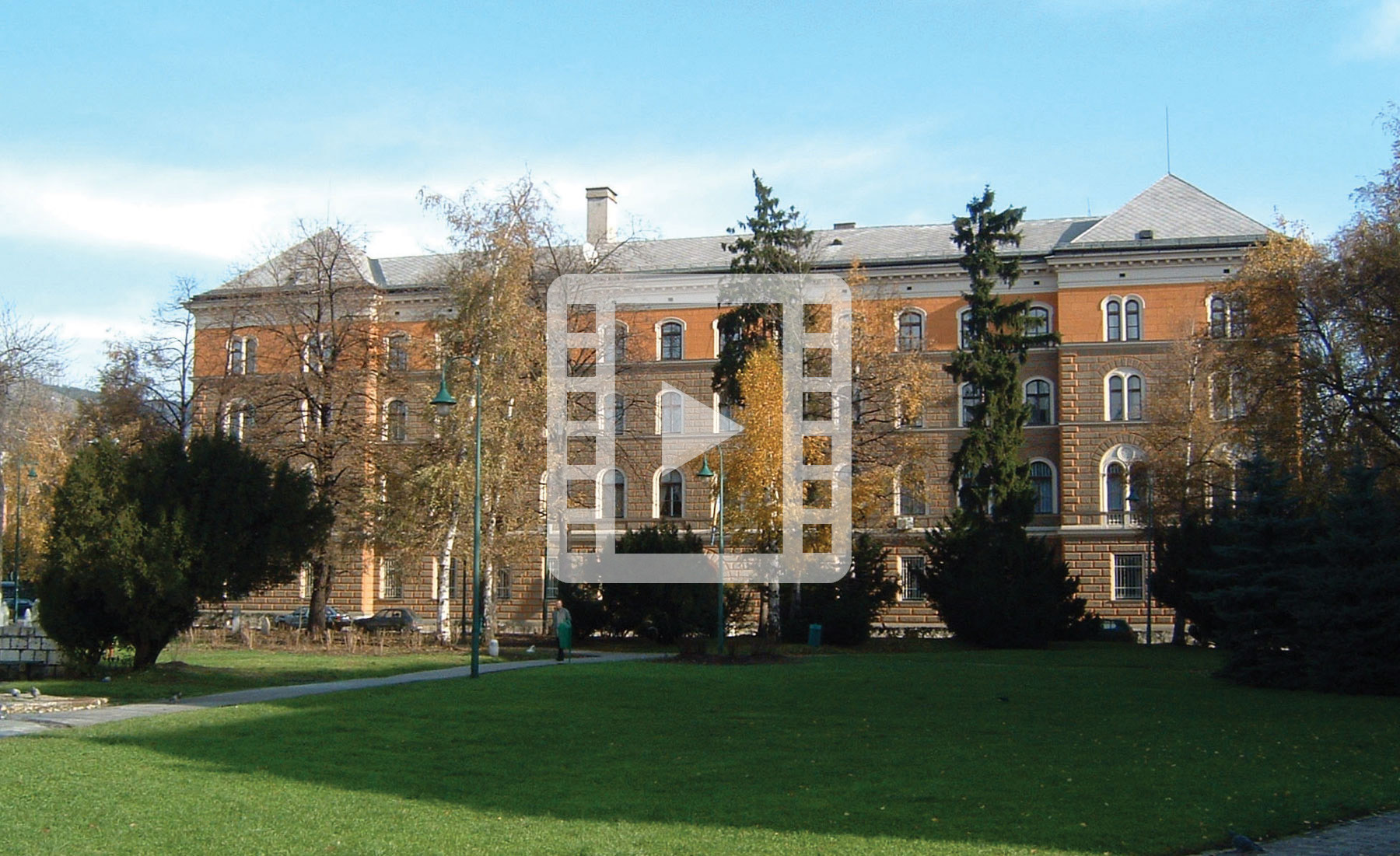At the continuation of the 158th Plenary Session, the Constitutional Court of Bosnia and Herzegovina examined and decided on appeals and on the issues relevant for its work.
The Constitutional Court singles out the following decisions:
AP-1253/21 – The Constitutional Court dismissed the appeal of the appellant who had the capacity as the defendant in the proceedings before the ordinary courts conducted upon the lawsuit filed by the plaintiff against the appellant over unjust enrichment. The following is relevant, inter alia, in the pertinent case: It follows from the minutes of the Basic Court from the main hearing held on 16 January 2017, which were submitted as an attachment to the appeal, that the hearing began at 9:00hrs, that the appellant was present at the hearing in his capacity as the defendant, and that no one appeared on behalf of the plaintiff, although the plaintiff was duly notified. Thereafter, at the appellant’s proposal, the court rendered a ruling that the lawsuit in this matter was considered withdrawn. The Basic Court went on to note in the minutes that the plaintiff’s representative appeared at 9:06hrs, while the appellant’s attorney was dictating the request for the reimbursement of the costs of the proceedings, and that she justified her absence by saying that the clock on the office wall was running late. The Basic Court rendered a ruling for the record thereby rendering ineffective the ruling from the same hearing, according to which the lawsuit in the specific legal matter was deemed withdrawn, whereafter the hearing resumed. Due to the described behaviour of the adjudicating judge of the Basic Court, the appellant filed a request for her disqualification. The president of the Basic Court rendered a ruling dated 23 January 2017 granting the request for the disqualification of the judge in the said case, whereafter the case was reassigned to another judge. In the reasoning for the ruling, it was stated that the court, within the meaning of Article 97, paragraph 3 and Article 198, paragraph 3 of the Law on Civil Procedure (“the Law on Civil Procedure”), is bound by its rulings and cannot amend them because it did not decide on procedural issues relating to litigation management. According to the assessment of the court president, this leads to a conclusion that it was not possible to amend the ruling, by which virtue the lawsuit in the present legal matter was deemed withdrawn. As the adjudicating judge issued a ruling rendering ineffective the ruling deeming the lawsuit in the present legal matter withdrawn, therefore contrary to Article 97, paragraph 3 of the Law on Civil Procedure, the president of the court assessed that the above was a circumstance that called into question the impartiality of the judge, which is why her disqualification was requested.
In this connection, the Constitutional Court considers that in the present case, although the president of the court established that the judge acted contrary to Article 97, paragraph 3 of the Law on Civil Procedure, when she revoked the ruling on the withdrawal of the lawsuit for the record of the hearing, insistence on the ruling on the withdrawal of the lawsuit to remain in effect would be excessively formalistic and contrary to the basic principles of fair and cost-efficient conduct of civil proceedings. A sanction for a delay of only six minutes, in a situation where the plaintiff's representative explained immediately upon arrival the reasons and requested for the hearing to continue, which the court assessed as justified, would not be commensurate with the goal of procedural discipline, nor would it serve the interests of justice. The Constitutional Court deems that in this case, although restoration to the original condition was not formally requested, the Basic Court essentially acted in accordance with Article 328 of the Law on Civil Procedure, because immediately upon the arrival of the plaintiff's representative at the hearing (after only six minutes), it deemed the delay justified and continued the hearing. In this manner, according to the Constitutional Court, the Basic Court in fact approved the restoration to the original condition by rendering ineffective the ruling on the withdrawal of the lawsuit. In doing so, the Constitutional Court observes that the Basic Court did not amend the already final procedural decision, contrary to Article 84, paragraph 1 of the Law on Civil Procedure, rather it reviewed its actions during the same hearing, in light of the circumstances that subsequently arose (the arrival of the attorney and justification). In view of the above, the Constitutional Court points out that the insistence on keeping in effect the ruling on the withdrawal of the lawsuit, despite a minor and justified delay, would lead to unjustified formalism, unnecessary procedural complexity and a violation of the principle of cost-efficiency referred to in Articles 7 and 10 of the Law on Civil Procedure. Taking into account all of the above, the Constitutional Court deems that the Basic Court essentially applied the legal mechanisms correctly, even if it did not formally use the phrase “restoration to the original condition”.
Also, the Constitutional Court indicates that procedural fairness practically means a party-conceived adversarial procedure in which both sides are heard in such a way that both sides are ensured a mutually equal position before the court. In the case of Lazarević v. Croatia (see ECtHR, Application no. 61435/08, admissibility decision of 30 September 2010, with further references), the European Court stated: “[…] The Court reiterates that the concept of a fair trial also implies the right to an adversarial procedure. This right means that parties to criminal or civil proceedings must in principle have the opportunity not only to disclose any evidence necessary to succeed in their claims but also to be aware of all the evidence and statements submitted, or submitted with a view to influencing the court’s decision, and to comment on them […]. This position does not change when the statement is neutral with regard to the issue to be decided by the court, or, in the opinion of a certain court, does not present any fact or assertion that has not already appeared in the contested decision […].” In light of the aforementioned practice, the Constitutional Court deems that the insistence on keeping in effect the ruling on the withdrawal of the lawsuit, despite the plaintiff’s slight delay, would constitute excessive formalism within the meaning of the aforementioned case law of the European Court and would call into question the procedural fairness of the proceedings, which requires the court to take into account the circumstances of the case and to make it possible for the party to exercise the right to be heard, without unnecessary formal burden.
AP-2548/21 – The Constitutional Court dismissed the appeals in the present case. The appellants are forensic experts who performed expert examinations in prior proceedings pursuant to court orders. The courts that conducted these proceedings issued decisions awarding the appellants specific amounts as compensation for the costs of the expert examinations. These compensations have never been paid to the appellants. For that reason, the appellants filed lawsuits against the defendant (Republika Srpska) seeking payment of outstanding amounts arising out of the costs of expert examinations performed. The Basic Court in Banja Luka and the Basic Court in Kotor Varoš granted the claims explaining that the advance payments for the expert examinations were paid into a special-purpose account – a deposit account managed and disposed by the Ministry of Finance of the Republika Srpska. The Basic Courts reasoned their granting of the claims by the application of Article 749 of the Law on Obligations pointing out that the contract on mandate was made between the appellants and the defendant because the courts had engaged the appellants to perform the expert examinations. The courts also noted that the actions of the defendant were contrary to the statutory provisions and that the appellants suffered damage within the meaning of the relevant provisions of the Law on Obligations. The County Court in Banja Luka granted seven appeals of the defendant by dismissing the appellants’ claims. The remaining three appeals of the defendant were dismissed and the first instance judgements were upheld. The Supreme Court of the Republika Srpska granted the defendant’s requests for reviews of the second instance decisions by which the defendant’s appeals were dismissed, and the lower court judgments were modified and the appellants’ claims dismissed. In the reasons of its decision, the Constitutional Court recalls its case law in which it addressed the same or similar factual and legal issues (Decisions no. AP-4621/20 and AP-367/21) which concerned the decisions on the payment of costs for the expert examinations as enforceable decisions. It was pointed out that the appellants already had court rulings regarding the payment of costs for the expert examinations and, thus, they had the possibility to initiate enforcement proceedings. The Constitutional Court believes that the appellants’ claims were definitely established and therefore should not have been subject to re-examination in any proceedings, as such an approach calls into question the very meaning and purpose of the rulings made regarding the payment of costs for expert examinations. In view of the foregoing, the Constitutional Court holds that the appellants would not have had a “legitimate expectation” that, in addition to the existing rulings on the payment of expert examination costs, their claims would be granted in the specific civil proceedings. The Constitutional Court finds that, following the regular course of events, the appellants should have initiated enforcement proceedings against the defendant, rather than filing lawsuits, despite the initial stance of the enforcement courts that these were not enforceable titles, in order to settle their claims.
AP-1642/22 – In this case a single set of proceedings was initially conducted before the Court of Bosnia and Herzegovina against the appellant and S.Š. for the criminal offence of giving gifts or other forms of benefits, and against A.M. for the criminal offence of accepting gifts and violation of law by judge. After that the criminal proceedings were separated to the proceedings against the appellant and S. Š on the one hand, and those against the accused A. M. on the other. In the pertinent criminal proceedings, the appellant was convicted of the criminal offence of giving gifts or other forms of benefits by the judgment of the Municipal Court in Sarajevo, which was upheld by the judgment of the Cantonal Court in Sarajevo. The Constitutional Court points out in its decision that proper administration of justice in the circumstances of the specific case implied the Cantonal Court’s obligation to take into account a newly created circumstance - the judgement of acquittal of the accused A. M. - in deciding on the appellant’s appeal, because it was a decisive legal issue related to the determination of the appellant’s criminal liability and the existence of a corruption alliance - an agreement between the appellant, S. Š. and A. M. The aforementioned omission of the Cantonal Court, which consisted of disregard of a specific, relevant and important issue - on which the existence of the criminal offence with which the appellant was charged depends - resulted in the lack of sufficient reasons in the court decision in the specific circumstances of the present case. For that reason, the Constitutional Court granted the appeal and concluded that in the circumstances of the present case there has been a violation of the appellant's right to a fair trial – to a reasoned court decision.
AP-983/24 - In the present case, the Constitutional Court granted the appellant’s appeal and found a violation of the right to a fair trial under Article II(3)(e) of the Constitution of Bosnia and Herzegovina and Article 6(1) of the European Convention. The conviction was, to a decisive extent, based on the findings and opinion of the prosecution’s expert witness, the legality of which was not convincingly reasoned by the County Court. Furthermore, when viewed in its entirety, the proceedings failed to eliminate doubts concerning the existence of certain decisive facts in a manner favourable to the appellant, thereby violating the principle of in dubio pro reo. As a result, the Constitutional Court quashed the judgments of the Supreme Court and the County Court and remitted the case to the County Court in Istočno Sarajevo, which is obligated to adopt a new decision urgently, in accordance with Article II(3)(e) of the Constitution of Bosnia and Herzegovina and Article 6(1) of the European Convention. Specifically, in the proceedings in which the challenged judgments were rendered, the appellant was accused of causing a traffic accident in the time, place, and manner described in the indictment, in violation of Article 36(1) of the Law on Basics of Road Traffic Safety in Bosnia and Herzegovina (“the Law on Road Traffic Safety”). According to the indictment, the appellant, when entering the main road from an access road, took the action of turning left with his vehicle, but did not first make sure that he could do it in a safe manner, without disturbing the vehicles coming from his left. The prosecution asserted that, by performing said manoeuvre, the appellant committed the criminal offence of endangering public traffic under Article 410(3) in conjunction with paragraph (2) of the Criminal Code of the Republika of Srpska (“the CCRS”). By judgment no. 91 0K 036214 18 K of 11 November 2019, The Basic Court acquitted the appellant of the charges of having committed the criminal offence with which he had been indicted. In this case, the County Court quashed the judgment on the grounds that the safety of the turn action had not been properly reasoned, and ordered a retrial. Following the conduct of a so-called “super-expertise”, the Basic Court, in its judgment rendered in the renewed proceedings, found the appellant guilty and sentenced him to one year of imprisonment. The County Court in Istočno Sarajevo rendered a judgment modifying the first-instance judgment and imposing a sentence of four years of imprisonment on the appellant. The court found that the testimonies of the witnesses, the material evidence, and the findings of the prosecution’s expert and the Faculty of Transport were properly admitted, while the defence expert’s findings were dismissed on justified grounds. The Constitutional Court determined that the ruling ordering the so-called super-expertise did not specify, either in its operative part or reasoning, the facts to be examined through such expertise, despite this being explicitly required by the second sentence of Article161(1) of the Criminal Procedure Code of the Republika Srpska (“ the CPC RS”).
Furthermore, the Constitutional Court found that the decision of the County Court failed to express a clear position regarding the admissibility of the said evidence. Instead, in the view of the Constitutional Court, the County Court adopted a contradictory stance, stating that the decision on the expert examination was not rendered in accordance with the law, while simultaneously claiming that the judgment on the appellant’s guilt did not rely on this expert examination, but solely on the findings of the prosecution’s expert. The Constitutional Court also held that a causal link between the appellant’s conduct and the resulting consequence was not convincingly established. Moreover, the courts failed to provide sufficient reasons as to why the responsibility for the accident and its consequences was solely attributed to the appellant, nor did they consider the possible involvement of other contributory causes. In light of the foregoing, the Constitutional Court concluded that the proceeding, when viewed in its entirety, did not eliminate reasonable doubt regarding the decisive facts in a manner favourable to the appellant, thereby resulting in a violation of the principle of in dubio pro reo.
AP-2339/21 – In the present case, the appellant filed a claim for damages before the Municipal Court in Sarajevo against Sberbank BH d.d. Sarajevo (the defendant). By judgment of the Municipal Court, which was upheld by the Cantonal Court in Sarajevo, and against which the Supreme Court of the Federation of Bosnia and Herzegovina dismissed the petition for review, the appellant’s claim was dismissed. According to the reasoning of the ordinary courts, the appellant had concluded a contract for the opening and maintenance of a payment account with the defendant’s legal predecessor, Volksbank BiH d.d. Sarajevo, for the purpose of conducting domestic payment transactions. Under that contract, the appellant undertook to submit payment orders on prescribed forms, signed and certified by authorized persons whose signatures had been deposited with the defendant. In turn, the defendant undertook to execute payments in accordance with such orders. The ordinary courts held that the burden of proof was on the appellant to demonstrate that he suffered damage as a result of the defendant’s breach of contractual obligations. The courts found that the appellant had failed to prove such claims, even by means of a financial expert examination. It was reasoned that a mere breach of a contractual obligation does not necessarily result in damage, especially considering that the payment orders were signed by the appellant’s own director. If there had been any diminution of the appellant’s assets, the appellant could have been substantiated it with its financial records (gross balance sheet) for the disputed period. The Constitutional Court found that the ordinary courts, in the reasoning of their decisions, provided relevant and sufficient grounds for their conclusions, which do not indicate any arbitrariness. In particular, the Constitutional Court noted that the courts applied the rules on the burden of proof and offered detailed reasoning for their finding that the appellant failed to substantiate its allegations. Therefore, the Constitutional Court held that there was no indication of a violation of the right to a fair trial, the right to property, or the right to an effective legal remedy, and rejected the appeal as manifestly (prima facie) ill-founded.
At this session, the Constitutional Court also decided on certain relevant human resources issues.
Thus, in accordance with Article 82 of the Rules of the Constitutional Court, at today's plenary session, the newly elected judge Larisa Velić gave and signed a solemn declaration. Judge Velić will assume office on 31 May 2025. The term of office of the current judge and President of the Constitutional Court, Seada Palavrić, will end on 30 May 2025 due to her retirement.
Furthermore, pursuant to Articles 83 and 84 of the Rules of the Constitutional Court of BiH, at this session, the Constitutional Court appointed Mirsad Ćeman President of the Constitutional Court of Bosnia and Herzegovina for the remaining period of the term of office of the current President Seada Palavrić. The term of office of the appointed President Mirsad Ćeman begins on 31 May 2025.





